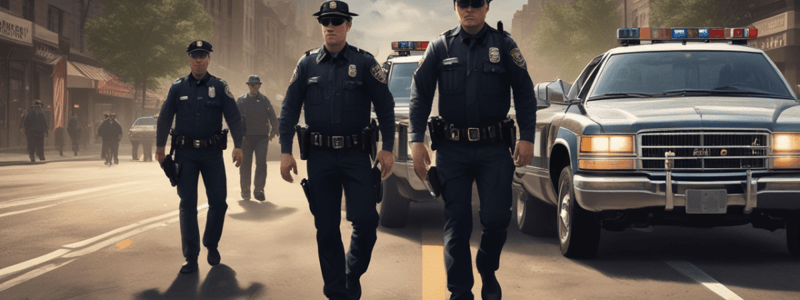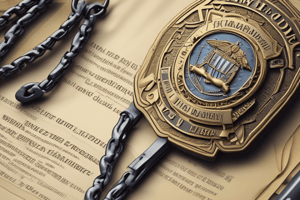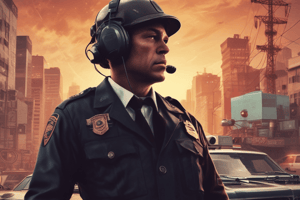Podcast
Questions and Answers
What is the primary focus of the lesson plan on patrol and jail management?
What is the primary focus of the lesson plan on patrol and jail management?
- Preparation for duty by the patrol officer (correct)
- The importance of autogenic breathing techniques
- The conditions of the mind (color code)
- The role of the peace officer in different service assignments
What are the four sources of information that a patrol officer should use daily to maintain an up-to-date awareness of activity in their patrol area?
What are the four sources of information that a patrol officer should use daily to maintain an up-to-date awareness of activity in their patrol area?
- Criminal records, local geography, uniform inspections, and equipment checks
- Roll-call, personal inspections, physical and mental reactions, and autogenic breathing
- Radio broadcasts, social media, local news, and word of mouth (correct)
- Missing person reports, person down cases, sick/injury cases, and chronic complaints
Why is it important for a patrol officer to know directions and geographical locations on patrol duty?
Why is it important for a patrol officer to know directions and geographical locations on patrol duty?
- To understand the local culture and demographics
- To identify odd and even numbered addresses
- To locate the nearest police station
- To respond quickly to emergency situations (correct)
What is the purpose of roll-call according to the lesson plan?
What is the purpose of roll-call according to the lesson plan?
What are the physical and mental reactions to a perceived threat that a patrol officer should be aware of?
What are the physical and mental reactions to a perceived threat that a patrol officer should be aware of?
What is the importance of autogenic breathing techniques and visualization in patrol duty?
What is the importance of autogenic breathing techniques and visualization in patrol duty?
What is the purpose of identifying the conditions of the mind (color code) in patrol duty?
What is the purpose of identifying the conditions of the mind (color code) in patrol duty?
Why is it important for a patrol officer to handle non-criminal patrol assignments?
Why is it important for a patrol officer to handle non-criminal patrol assignments?
What is the primary focus of preparing for duty at home?
What is the primary focus of preparing for duty at home?
What is the purpose of checking the vehicle hot sheet?
What is the purpose of checking the vehicle hot sheet?
What should an officer do when finding contraband in the vehicle after transporting a prisoner?
What should an officer do when finding contraband in the vehicle after transporting a prisoner?
Why is it important for an officer to know directions and geographical locations on patrol duty?
Why is it important for an officer to know directions and geographical locations on patrol duty?
What is the primary purpose of roll-call?
What is the primary purpose of roll-call?
What should an officer prioritize during roll-call?
What should an officer prioritize during roll-call?
What is the purpose of checking the precinct/district desk books?
What is the purpose of checking the precinct/district desk books?
What is included in the incidental equipment kit?
What is included in the incidental equipment kit?
What should an officer do when leaving the station for patrol?
What should an officer do when leaving the station for patrol?
What is the purpose of the officer going off-duty?
What is the purpose of the officer going off-duty?
What is the primary goal of identifying a 'Problem Area' during a street situation?
What is the primary goal of identifying a 'Problem Area' during a street situation?
What is the main difference between 'Observation' and 'Perception'?
What is the main difference between 'Observation' and 'Perception'?
What is the primary purpose of 'Autogenic Breathing' techniques?
What is the primary purpose of 'Autogenic Breathing' techniques?
What is the effect of high stress on perception?
What is the effect of high stress on perception?
What is the main purpose of 'Crisis Rehearsal'?
What is the main purpose of 'Crisis Rehearsal'?
What is 'Focus Point'?
What is 'Focus Point'?
What is the effect of adrenaline surge on the body?
What is the effect of adrenaline surge on the body?
What is the primary goal of 'Description'?
What is the primary goal of 'Description'?
What is the effect of 'Astigmatism' on vision?
What is the effect of 'Astigmatism' on vision?
What is the main difference between 'Physical Reactions' and 'Mental Reactions' to a perceived threat?
What is the main difference between 'Physical Reactions' and 'Mental Reactions' to a perceived threat?
What is the condition of the mind characterized by a state of unawareness of one's environment?
What is the condition of the mind characterized by a state of unawareness of one's environment?
What is the primary responsibility of police officers as public servants?
What is the primary responsibility of police officers as public servants?
What is the importance of maintaining a professional demeanor when handling non-criminal assignments?
What is the importance of maintaining a professional demeanor when handling non-criminal assignments?
What is the first step in handling a missing person assignment?
What is the first step in handling a missing person assignment?
What is the purpose of radiating the search out from the area where the child was last seen in a missing child assignment?
What is the purpose of radiating the search out from the area where the child was last seen in a missing child assignment?
What is the next step after conducting a search of the immediate area in a person with cognitive impairment assignment?
What is the next step after conducting a search of the immediate area in a person with cognitive impairment assignment?
What is the purpose of determining the cause of the subject's condition in a person down assignment?
What is the purpose of determining the cause of the subject's condition in a person down assignment?
What is the difference between a sick/injury assignment and a person down assignment?
What is the difference between a sick/injury assignment and a person down assignment?
What is the importance of maintaining a civil and professional attitude when handling non-criminal assignments?
What is the importance of maintaining a civil and professional attitude when handling non-criminal assignments?
What is the primary goal of handling non-criminal assignments?
What is the primary goal of handling non-criminal assignments?
When dealing with a person with cognitive impairment, what is the first step?
When dealing with a person with cognitive impairment, what is the first step?
What is the priority when dealing with a person who is down?
What is the priority when dealing with a person who is down?
What is the procedure for dealing with a chronic complaint?
What is the procedure for dealing with a chronic complaint?
What is the priority when dealing with an animal bite?
What is the priority when dealing with an animal bite?
What is the goal when dealing with an emotionally disturbed person?
What is the goal when dealing with an emotionally disturbed person?
What is the purpose of removing family or friends from the immediate area when dealing with an emotionally disturbed person?
What is the purpose of removing family or friends from the immediate area when dealing with an emotionally disturbed person?
What is the role of the 'initiator' when dealing with an emotionally disturbed person?
What is the role of the 'initiator' when dealing with an emotionally disturbed person?
What is the priority when dealing with a lost or stranded person?
What is the priority when dealing with a lost or stranded person?
What is the purpose of referring to utility company pamphlets and Highway Patrol information?
What is the purpose of referring to utility company pamphlets and Highway Patrol information?
What is the purpose of enacting an Endangered Silver Advisory?
What is the purpose of enacting an Endangered Silver Advisory?
When interacting with a person who has a cognitive impairment, what is the recommended approach?
When interacting with a person who has a cognitive impairment, what is the recommended approach?
What is the primary goal of the 'Initiator' role in a crisis situation?
What is the primary goal of the 'Initiator' role in a crisis situation?
What is the most common form of dementia that causes cognitive impairment?
What is the most common form of dementia that causes cognitive impairment?
What should a patrol officer do when responding to a situation involving a person with cognitive impairment?
What should a patrol officer do when responding to a situation involving a person with cognitive impairment?
What is the purpose of a thorough preliminary investigation by a patrol officer?
What is the purpose of a thorough preliminary investigation by a patrol officer?
What should a patrol officer do when encountering a confused older adult who is not noted as missing?
What should a patrol officer do when encountering a confused older adult who is not noted as missing?
What is the importance of identifying common conditions that cause cognitive impairment?
What is the importance of identifying common conditions that cause cognitive impairment?
What is the recommended course of action when dealing with a person who is cognitively impaired and becomes lost while driving?
What is the recommended course of action when dealing with a person who is cognitively impaired and becomes lost while driving?
What is the purpose of the 'Force Continuum'?
What is the purpose of the 'Force Continuum'?
What should a patrol officer do when encountering a cognitively impaired individual who is left alone or dropped off at a location without a caregiver?
What should a patrol officer do when encountering a cognitively impaired individual who is left alone or dropped off at a location without a caregiver?
What is the term for the concept that helps officers assess the risk they may be facing and react to it?
What is the term for the concept that helps officers assess the risk they may be facing and react to it?
According to the principle of north-by-northwest, where do even-numbered addresses typically appear?
According to the principle of north-by-northwest, where do even-numbered addresses typically appear?
What is the purpose of disseminating crime bulletins, hot sheets, and wanted information?
What is the purpose of disseminating crime bulletins, hot sheets, and wanted information?
What is the definition of autogenic breathing?
What is the definition of autogenic breathing?
What is the term for a state of environmental unawareness, often characterized by daydreaming or preoccupation?
What is the term for a state of environmental unawareness, often characterized by daydreaming or preoccupation?
What is the primary purpose of checking for contraband during a vehicle search?
What is the primary purpose of checking for contraband during a vehicle search?
What should an officer do when responding to a missing person report?
What should an officer do when responding to a missing person report?
What is the term for the process of identifying potential threats in a given area and reacting to them?
What is the term for the process of identifying potential threats in a given area and reacting to them?
What is the primary purpose of a roll-call?
What is the primary purpose of a roll-call?
What should an officer prioritize when handling non-criminal patrol assignments?
What should an officer prioritize when handling non-criminal patrol assignments?
What is the primary goal when dealing with an emotionally disturbed person (EDP)?
What is the primary goal when dealing with an emotionally disturbed person (EDP)?
What should you do if you encounter a hazardous situation while responding to a civil matter?
What should you do if you encounter a hazardous situation while responding to a civil matter?
What should you do if an animal control service is unavailable to quarantine an animal that has bitten someone?
What should you do if an animal control service is unavailable to quarantine an animal that has bitten someone?
Why is it important to know departmental policies?
Why is it important to know departmental policies?
What should you do when dealing with a lost or stranded traveler?
What should you do when dealing with a lost or stranded traveler?
What is the purpose of the Ministerial Alliance?
What is the purpose of the Ministerial Alliance?
What should you do if a victim is in need of medical attention?
What should you do if a victim is in need of medical attention?
What should you do if you encounter a situation that requires the assistance of another local agency?
What should you do if you encounter a situation that requires the assistance of another local agency?
What is the primary reason for recording the fact that an owner was notified of a hazardous situation?
What is the primary reason for recording the fact that an owner was notified of a hazardous situation?
What should you do when dealing with a chronic complainer?
What should you do when dealing with a chronic complainer?
Study Notes
Introduction to Patrol
- Preparing for duty begins at home, including personal appearance, hygiene, and mental preparation
- Uniform checks include cleanliness, pressing, proper fitting, cap billet wiped, shoes shined, and body armor
- Equipment checks include duty weapon loaded, reserve ammunition accessible, handcuffs accessible, whistle, flashlight, and baton
Preparation at the Station
- Four sources of information for maintaining awareness of activity in the patrol area:
- Roll calls
- Precinct/district desk books
- Vehicle hot sheets
- Officer going off-duty
- Equipment checks at the station:
- Incidental equipment (book of citations, traffic codes, updated departmental manual, etc.)
- Vehicle check (damage/defects, gas, cleanliness, required equipment, etc.)
Importance of Geographic Knowledge
- Knowing directions and geographical locations is crucial for patrol duty
- Remember the principle of "North-by-Northwest" for locating odd and even numbered addresses
Purposes of Roll-Call
- Discussing changes in policy and procedures
- Directed patrol
- Disseminating crime bulletins, hot sheets, and current "wanted" information
- Assessing manpower
- Officially inspecting uniform and equipment
Physical and Mental Reactions to a Perceived Threat
- Problem area: any person, object, or site that may produce a hazard
- Reaction: prompt identification of the threat and potential threats
- Area of responsibility: exact location within a problem area where an attack could emanate
- Focus point: clear and present threat that must be immediately controlled
Autogenic Breathing Techniques and Visualization
- Autogenic breathing: slow, deliberate four-count inhaling and four-count exhaling while visualizing warmth radiating throughout the body
- Importance of autogenic breathing and visualization for relaxation and stress reduction
Conditions of the Mind (Color Code)
- Levels of consciousness:
- Condition White: mind is internalized and not focused externally
- Condition Yellow: mind is relaxed and alert
- Condition Orange: mind is ready for danger
- Condition Red: mind is ready to fight or flee
- Condition Black: in a catatonic state, no focus is possible
Non-Criminal Assignments
- Handling non-criminal assignments is a necessary requirement of a patrol officer's job
- Examples of non-criminal assignments:
- Missing person/child
- Person down
- Sick/injury cases
- Chronic complaint
- Animal bite
- Lost/stranded travelers### Calls for Service General
- Be aware of the potential for criminal activity in any situation
- Avoid making superficial assessments of cases based solely on the assignment title
- Remember that non-criminal incidents may have the potential for additional investigation, such as:
- Accidental injury or assault
- Child abuse or missing persons
- Borrowing a vehicle without permission or stolen vehicles
- A thorough preliminary investigation by the patrol officer is crucial in these situations
Patrol Preparation
- Mental preparation is essential before starting a shift:
- Review previous shift's events and follow up as needed
- Prioritize tasks and check on specific individuals
- Personal equipment check:
- Ensure proper uniform and body armor
- Load duty weapon and reserve ammunition
- Carry handcuffs and have extra pairs available
- Possess a whistle, flashlight, and baton
- Review daily crime bulletins, wanted bulletins, and hot sheets
- Check for incidental equipment, such as a book of citations, traffic codes, and departmental manuals
Vehicle Check
- Inspect the vehicle for damage or defects
- Check the first aid kit, fire extinguisher, and shotgun combat loader
- Look for contraband in the vehicle, including under seats and between seat cushions
Patrol Strategies
- The principle of "north-by-northwest" indicates that even-numbered addresses appear on the south or east side of the street, while odd-numbered addresses appear on the north or west side
- Know your jurisdiction and be able to navigate it safely and efficiently
- Assess risk and react to situations using concepts such as:
- Problem area: identify potential hazards and react accordingly
- Area of responsibility: detect and control threats within a specific area
- Focus point: concentrate on a clear and present threat to protect yourself or others
- Use autogenic breathing and visualization to reduce stress and stay focused
Dealing with Citizens
- Oftentimes, citizens request police service for non-criminal issues
- Show concern and demonstrate interest in the citizen's problems
- Provide good service and assistance to the public
Missing Persons and Other Situations
- Missing person:
- Record all information provided by the reporting party
- Advise the person how to check with hospitals for unidentified injured persons
- Consult department policy and conduct an investigation if necessary
- Missing child:
- Verify the child is lost and not a runaway
- Find out if there were any arguments between parents or family members
- Note past problems and locations where the child was found
- Get all information possible and relay it to the radio dispatcher
- Person with cognitive impairment:
- Conduct a search of the immediate area
- Assume the person is missing and endangered
- Follow departmental protocols and collaborate with caregivers
- Person down:
- Determine the cause of the person's condition
- Initiate first aid and have the person conveyed to a hospital if necessary
- Notify emergency contacts and consult department policy
- Sick or injured person:
- Follow the same procedure as above
- Chronic complaint:
- Ascertain whether the matter is criminal or civil
- If criminal, investigate and enforce laws
- If civil, ensure it does not present a hazardous circumstance
- Animal bite:
- Initiate first aid if necessary
- Have the victim conveyed to a hospital as quickly as possible
- Contact animal control service to have the animal quarantined
- Lost or stranded persons:
- Provide assistance in contacting outside agencies or relatives
- Give or ascertain directions if needed
- Provide assistance in contacting taxi or tow services
EDP and Other Situations
- Emotionally disturbed person (EDP):
- The goal is to get the person to a treatment facility
- Circumstances often require police involvement, such as:
- Receiving a call for a person acting irrationally
- Receiving a call for an EDP causing or threatening harm to others
- Receiving a call for an EDP causing or threatening harm to themselves
- Remove any family or friends from the immediate area
- If you have a partner, one of you acts as an "initiator" while the other provides support
Studying That Suits You
Use AI to generate personalized quizzes and flashcards to suit your learning preferences.
Description
This lesson plan covers the preparation for duty by a patrol officer, including knowledge of criminal activity, local geography, and proper uniform and equipment. It demonstrates how these factors can enhance the performance of a patrol officer.




